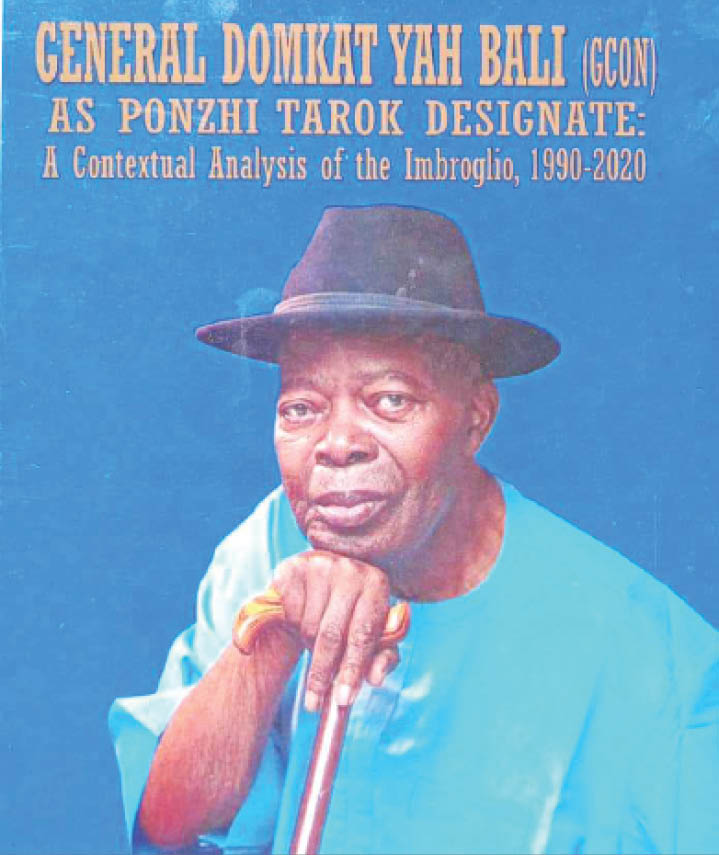Authors: Esther Bali, & Bata Musa
Title: General Domkat Yah Bali (GCON) As Ponzhi Tarok
Designate: A Contextual Analysis of the Imbroglio, 1990-2020
Publisher: Owerri, Nigeria. Sobon Books Limited, 2021, 60 pp
ISBN: 978-978-58584-3-3
Reviewer: Venerable Selcan Miner, OFR
Esther Bali and Bata Musa are renowned school administrators and scholars of acknowledgeable accomplishments who have published widely on a range of subjects, offering deep and thoughtful insights into topical issues and emerging trends in society.
Esther Bali, for example, has a collection of Tarok folktales and other related texts that provide exciting details into Tarok history, culture and tradition. As wife of late General Domkat Bali, Esther has the intriguing details of the narrative of her husband’s involvement in the Ponzhi Tarok chieftaincy matter, and thus has a compelling perspective to the issues that should attract special attention.
- THE BEARING: How Nigerian Women Are Holding Themselves Back In The Media
- Two children die as school toilet collapses in Niger State
Bata Musa, on the other hand, has enjoyed years of interaction with General Bali’s family and indeed the Tarok nation, which qualifies him as a cultural insider in Tarok discourse, and the historical vignettes of the Ponzhi Tarok chieftaincy stool. Thus, the authors are a fine combination to write a fascinating book on the subject they have engaged.
In the book, the authors give an unvarnished, and balanced account of General Domkat Bali, one of Nigeria’s finest military officers whose personal lifestyle and professional career were a deep expression of discipline, hard work, dexterity, integrity and uncommon intelligence. The book offers a unique glimpse and an explicit deconstruction of General Bali’s purported desire to occupy the revered stool of Ponzhi Tarok, and the complexities that accompanied the ventures, leading to his resignation in October 2014. The imbroglio that followed that resignation and the consortium of the correspondences that ensued between him and the Plateau State Government were brilliantly assembled and synthesized by the authors, giving thus, and interesting position that seeks to correct ‘other’ impressions and sensational puerility that have dominated the saga.
The book has six chapters in all, with each, giving a captivating account of the issues that prevailed. In Chapter One, titled Introduction, A former Nigerian Head of State, General Yakubu Gowon (GCFR), traced with clarity and precision the early years of General Domkat Yah Bali as he hopscotched life’s challenges in Zamko village of Langtang North LGA of Plateau State, through years of distinguished military service. General Gowon’s description of General Bali’s ‘hard work, humility, vision, perseverance, courage, incorruptibility, and unwavering pursuit of excellence in all undertakings are important signifiers into how he was imbued with leadership qualities that he patriotically delivered to the service of the nation without blemish. General Bali’s attempt at the stool of Ponzhi Tarok was the only recorded moment when he had a mixed reaction that trailed any of his endeavours in life.
General Gowon writes that: He [Gen Domkat Bali] reluctantly emerged as Ponzhi Tarok designate [d] on October 20, 2010, [December 20, 2010], awaiting installation/presentation of the staff of office. This development did not go down well with some Tarok stakeholders, and a Court action in a Jos High Court was instituted questioning the legality of the appointment. Following this Court action, and the resulting High Court restraining order, General Bali, a respecter of the rule of law, immediately expressed his desire to be relieved of the appointment as Ponzhi Tarok [which] was accepted by the Plateau State Government, with effect from 1st November, 2014’ (p.4).
Unfortunately, as General Gowon avers, the controversy surrounding the resignation and the other related matters concerning the stool persisted up to General Bali’s demise on 4th December, 2020. However, his service to the nation, his strength of character, modesty, self-effacement and philanthropic works are crucial aspect of his life style that demonstrated his practice of what Franklin Roosevelt called ‘the science of human relationship’. He believed that to whom much was given, much is expected, and because life gave him so much, he lavishly gave back to the society. He was strong and gracious, loving and empathic, training indigent children and helping the poor to savour their success. That was General Bali, a loving character, with a huge coded and all-embracing heart.
General Gowon’s input to the book, inarguably thus, provides the necessary recipe of facts that do not only stimulate the reader’s interest, but condenses the entire book into an intense first (introductory) chapter, as the remaining pages that follow are only but the explicating effect and road map of sort, for that first powerful beginning.
In chapters two and three, the authors picked up the dynamics and social order of Tarok society, chronicling the events leading to the evolution of the stool of Ponzhi Tarok. As they noted, the stool is a product of the amalgamation of the Hill and Plain Tarok on 22nd August, 1955. ‘It represents an embodiment of the cultural heritage of the Tarok People’ (p.9). The cluster of clans that make up Hill and Plain Tarok provides the compelling evidence that the Tarok have a history of inter-clan relationship and none is subservient to the other. This is the argument that has domination the impasses surrounding the stool since 2008 when HRH, Mr. Edward Cirdap Zhattau, the last occupant of the office, joined his ancestors.
The authors rightly submit that after the creation of the Ponzhi Tarok stool in 1955, no legal instrument was enacted to regulate the stool until the 1975 Gazette was promulgated by the Benue – Plateau State of Nigeria, designating two ruling families of Lagan of Guzum and Ce of Langtang. General Bali of the ‘Marzwal’ family of the Ce ruling clan, and was thus elegantly qualified to contest for the stool. His career in the Military, as the authors enunciate, had afforded him the privilege to serve the nation; and he did, with no record of peddling of any aspect of his personality to gain unmerited favour, as is common with most public servants and the failed coterie of elites in Nigeria today. He rather lived an astonishing lifestyle and garnered laurels and accolades on self-merit. The authors aptly pin down that General Bali had always applied his mind in the pursuit of a world that is more just, more fair and more humane:
He was seen and respected not only as an embodiment of the fundamental values of the Nigeria Army, but as a stabilizing factor in the military during his service years (p.21).
Of course, these quintessential attributes were significant enough for him to be honoured by the Ponzhi Tarok with the traditional title of ‘Bunu Langtang’, a giant leap for further traditional role and responsibility.
General Bali’s character of always deploying his conscience and conviction firmly lived with him as he worked against the prevailing pressures to contest for the vacant stool. When he eventually, reluctantly yielded to the pressures to ascent to the throne, the scenario became littered with controversies.
Chapter four explains that the State Government repealed the 1975 Gazette and promulgated the 2010 Gazette against the wish and expectation of most Tarok stakeholders, an act that unleashed an avalanche of controversies.
It is [was] within the ambience of the alleged 2010 Gazette that General Domkat Yah Bali (GCON) was selected and appointed as Ponzhi Tarok designate by the then Government on 20th October 2010, awaiting installation/presentation of the staff of office (p.26)
The selection led to a flurry of litigations and other cluster of huddles that did not help the process nor promote the desired peace, but rather hanged the Tarok nation on Aesop fable. The litany of cases that ensued after the selection, coupled with his failing health were two rhetorical clues, the authors lucidly argued, that informed General Bali’s decision to resign. Arguably, the book provides factuality of evidence to reconstruct the contentious claims that the Court restraining order and General Bali’s eventual resignation were some assorted myths. What other options would have been available for the General when a competent Court of law had issued a Form 48 with the following restraining Order:
Take Notice that unless you obey the Orders/Directions not to parade yourself or present yourself for installation as the Ponzhi Tarok, pending the hearing of the Motion on Notice for Interlocutory Injunction, as contained in this order attached hereto, you will be guilty of contempt of this Court and will be liable to be committed to Prison (Appendix D, p. 47)
General Bali understood the dynamics of the impasse and its implication on his declining health status. On 15th October, 2014, he tendered a letter to the State Government, stating his desire to be relieved of the appointment (Appendix E, p.48). Even though he had cited his declining health as reason for his decision, the controversy and sagging approval rating (by majority of his kinsmen) that had trailed his appointment were also underlying factors. Plateau State Government accepted the resignation with effect from 10th November, 2014 via a letter signed by the Honourable Commissioner for Local Government and Chieftaincy Affairs (Appendix F, p.50).
Ordinarily, government’s approval of General Bali’s resignation would have ended the saga, but it unfortunately stirred yet, another round of confusion as Plateau State Government assumed a starring [new] role in the impasse, as it continues to pay the salary of Ponzhi Tarok into the General’s personal account, after approving his resignation. General Bali of course, wrote myriad of letters, reminding government to stop the unmerited salary as he was no longer Ponzhi Tarok (Appendix H, I & J, pp, 52, 53,54). The documents attached by the authors to validate this claim firmly support the impression that General Bali was a patriot, and a man of impeccable character who fought to the end, to preserve his name and integrity. The documents also raise questions about the role of the Plateau State Government that seems poised to contradict the issues and also buck the position of law on the Ponzhi Tarok chieftaincy crises. Whatever is the reason of the government for the role that played out is a sturdy conundrum that this book has raised, which should be unraveled to end the power play and intrigues surrounding the stool of Ponzhi Tarok.
Chapter five reveals General Bali’s desires, upon death, to be interred with military honour. A will that the family ensured was respected. As the authors succinctly analyzed.
It would have been sacrilegious and dishonourable to go against his last wish which was scared. That was the mandate he gave to the family. It had to be followed to the letter (p,35)
The most resonating and thought-provoking strand of the book is the attempt by General Bali to negotiate peace for his people and persuade the Plateau State Government to end the legal battles on the Ponzhi Tarok stool, which the government had become a litigant, and to kick processes of selection of the monarch, a plea which he described as his last wish, and a weight of responsibility that was as nearly as physical burden. He passionately revealed his heartbeat in this regard in his last letter to Governor Simon Bako Lalong of Plateau State when he said:
My earnest desire now, and indeed the collective interest of the Tarok nation is that the vacancy be filled without further delay. I look forward to partaking in the coronation ceremony of my successor. As a senior Tarok citizen and elder statesman, I am quite worried that the issue has dragged on for this long. The Tarok nation will remain eternally grateful to you for bringing this matter to a closure soonest (Appendix K, p.55)
General Bali’s closing effort to see to the end of the controversy as captured above, summarizes his selfless endeavour and unparallel love for his people. He did not achieve the mission, but left behind a noble legacy for the Tarok nation.
The myriad of documents supplied by the authors to validate each claim, the pictures inserted, the depth of analysis of the issues and confidence of interpretation of facts in this book will ensue for decades and, probably provoke would-be critics to counter-write the authors and present their own version of the narrative, if any on the impasse.
The language employed, and style of presentation of facts and knowledge of the sub-matter deserve our collective commendation. The cover design and the blurb are also excellent embellishment. These attributes make the book not just captivating to read, but engrossing and important for everyone who wants to know the facts of the matter, to get a copy.
I have, however, made a keen observation that I believe constitute a very minor gap that the authors can correct in a subsequent edition. This so-called gap does not in any way invalidate the propriety of facts as canvassed, but a necessary observation to enrich the content. For example, most of the chapters can be developed further to explicate the contextual issues to provide the necessary depth and richness of analysis that will give the book a riveting form that will make it more vivid.
On a final note, the book General Domkat Yah Bali (GCON) As Ponzhi Tarok Designate: A Contextual Analysis of the Imbroglio, 1990-2020 is quite revealing and refreshing, and has answered most questions on the politics of his selection as Ponzhi Tarok, the legal tussles that trailed his appointment, the pronouncements of the courts, his resignation and other intrigues that all rest on a single truth that every reader has the right to know, and the authors have done justice to it.
I recommend this book as a must-read for everyone that has the desire to know the truth about the involvement of General Domkat Bali in the Ponzhi Tarok chieftaincy saga.

 Join Daily Trust WhatsApp Community For Quick Access To News and Happenings Around You.
Join Daily Trust WhatsApp Community For Quick Access To News and Happenings Around You.



